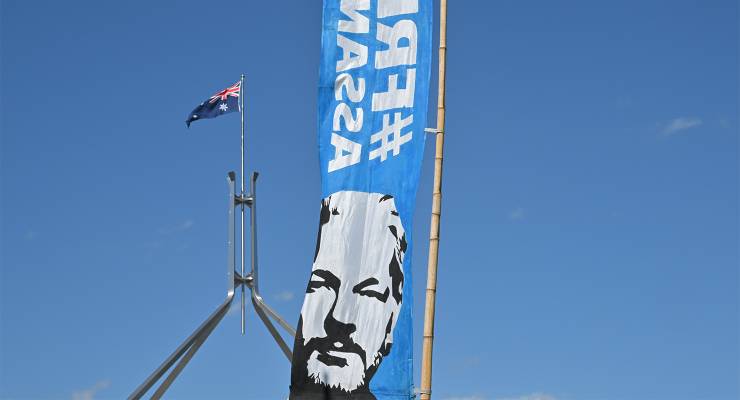
Julian Assange is running out of options to fight his extradition to the US, but a hearing in a UK court this week could allow him another chance to appeal.
Assange’s father John Shipton told Crikey all hope was not lost: “Lawyers say Julian’s arguments are strong, and odds are if arguments are given their due weight and UK law is honoured, an appeals hearing will be allowed.”
Shipton spoke to Crikey while en route to London, where Assange’s legal team will argue before the High Court that the WikiLeaks founder should get permission to appeal the extradition. A two-day hearing has been scheduled for February 20 and 21, meaning arguments will be heard from about 9pm Tuesday, Australian time.
Former detainee and Macquarie University Journalism Professor Peter Greste said Assange’s legal case had become “politicised”, and risked being impacted by the US presidential election campaign and the likelihood there’ll be an imminent election in the UK.
“You’ve effectively got both the US and UK in campaign mode, and it does complicate Julian’s case. It becomes a political rather than judicial issue,” Greste told Crikey.
“As a former detainee myself, I understand on a very personal level what it’s like to be going through the kind of imprisonment he’s enduring at the moment. Everytime I think about him it makes my stomach churn.”
On the eve of the hearing, a coalition of journalists’ unions from around the world called for the US to drop the espionage charges at the heart of the extradition case.
“Julian Assange faces prosecution for actions that are the daily work of journalists — cultivating sources and exposing criminal behaviour. His conviction would jeopardise journalism the world over,” read a joint statement from the International Federation of Journalists, the European Federation of Journalists, the UK National Union of Journalists and Australia’s Media, Entertainment & Arts Alliance.
“To safeguard free speech we demand that Assange is freed at once, and that all charges against him are dropped.”
Assange has been indicted on 18 US charges, including under the Espionage Act. He risks up to 175 years in prison if convicted on all counts.
Last week, the Australian Parliament passed a motion calling for Assange, an Australian citizen, to be allowed to return to his country of origin.
“I hope this can be resolved,” Prime Minister Anthony Albanese said. “I hope it can be resolved amicably. It’s not up to Australia to interfere in the legal processes of other countries, but it is appropriate for us to put our very strong view that those countries need to take into account the need for this to be concluded.”
Amnesty International warned Assange’s extradition could have a profound “chilling effect” on global media freedoms. A press release from the organisation said Assange may be able to make an application to the European Court of Human Rights even if this week’s arguments fail.








There must be some sort of kudos for Assange in the fact that a power such as the US (and the UK) would go to to such extremes, and expose their national insecurities, as to bring to bear such resources, to make an example of him to deter others from challenging their dictatorial powers.
But it also says a lot about those elements of a media that play along with the propaganda interests of such governance.
You can say as much as you like about it; Bullshit Mountain stands yet.
We live in Zappa’s theatre, with the brick wall peeking through the scenery.
You can say as much as you like about it; Bullsht Mountain stands yet.
We live in Zappa’s theatre, with the brick wall peeking through the scenery.
It’s notable that all the quotations from Peter Greste in the article go no further than showing some sympathy and saying that Assange’s incarceration makes Greste feel bad. Like he’s sorry for himself. Has Greste finally recognised that Assange is a journalist, being punished for journalism? Apparently not. Is Greste calling for Assange’s persecution to end and for him to be freed? Apparently not.
To me there’s little difference between the Navalny murder and the Assange case. If he doesn’t get released soon his death will also be the result of a political tyranny. I wonder if that would result in the same self-righteous outcry!?
I think there are important differences, but your basic point stands. Many of those Western leaders throwing stones at Putin right now are standing in glass houses, for all that Putin deserves their opprobrium and more.
In principle I think there is really little difference. Most current leaders dwell in glass houses – which they seem to think reflect their glory.
I had a similar thought this morning when I heard a radio report that the ambassadors of both the UK and USA had laid flowers on a site in Moscow to mark Navalny’s “sudden death”. A UK court is considering extraditing an Australian citizen (already incarcerated for almost all of the last 12 years) to the USA where the Australian is certain to die?
Terrible when it’s Putin dealing with Navalny but ok for the UK and USA to treat an Australian in an equally appalling way? Such hypocrisy!!
Angry old men in the Pentagon won’t let the prey slip at this late stage. Their CIA minnions have him almost delivered, neatly packaged in orange and steel, sudden death syndrome injection handy. National security wins again. Go, team!
Pitiful.
If the Australian government had the cojones to say to the US, ‘drop the case and let Assange go free, or Aukus is cactus’, perhaps the US might listen. However since we have never said no to our ‘friends’ in America on any issue at all, it’s but a pipe dream. Gee, I wish we were NZ and had some guts…..
Not every NZ government. The latest one is thinking of joining AUKUS.